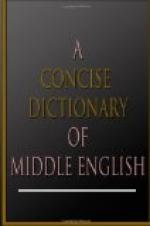We thus obtain fifteen excellent examples of the use of this word, with the full context and an exact reference (easily verified) in every case. And, in the above instance, all the quotations lie within the compass of the eleven texts in the Clarendon Press Series denoted, respectively, by S, S2, S3, C, C2, C3, W, W2, P, H, and G.
The original design was to make use of these text-books only; but it was so easy to extend it by including examples to be obtained from other Glossaries and Dictionaries, that a considerable selection of interesting words was added from these, mainly for the sake of illustrating the words in the Clarendon text-books. These illustrative words can be fully or partially verified by those who happen to possess all or some of the works cited, or they can safely be taken on trust, as really occurring there, any mistake being due to such authority.
A second example will make this clearer. ’Brant, adj. steep, high, MD, HD; brent, JD; brentest, superl. S2.—AS. brant (bront); cp. Swed. brant, Icel. brattr.’
Omitting the etymology, the above information is given in two short lines. Those who possess the ‘Specimens of English’ will easily find the example of the superl. brentest. By consulting MAtzner’s, Halliwell’s, and Jamieson’s Dictionaries, further information can be obtained, and the full article will appear as follows:—
’Brant, adj. steep, high, MD [brant, brent, adj. ags. brand, arduus, altus, altn. brattr, altschw. branter, schw. brant, bratt, dAn, brat, sch. brent, nordengl. Diall. brant: cf. “brant, steepe,” Manipulus Vocabulorum, p. 25: steil, hoch.—“Apon the bald Bucifelon brant up he sittes,” King Alexander, ed. Stevenson, p. 124; “Thir mountaynes ware als brant upri3*e as thay had bene walles,” MS. quoted in Halliwell’s Diet., p. 206; “Hy3*e bonkkes & brent,” Gawain and the Grene Knight, l. 2165; “Bowed to A3/4e hy3* bonk A3/4er brentest hit wern,” Alliterative Poems, ed. Morris, Poem B, l. 379]; HD [brant, steep. North: “Brant against Flodden Hill,” explained by Nares from Ascham, “up the steep side;” of. Brit. Bibl. i. 132, same as brandly?—“And thane thay com tille wonder heghe mountaynes, and it semed as the toppes had towched the firmament; and thir mountaynes were als brant upri3*te as thay had bene walles, so that ther was na clymbyng upon thame,” Life of Alexander, MS. Lincoln, fol. 38]; JD [brent, adj. high, straight, upright; " My bak, that sumtyme brent hes bene, Now cruikis lyk are camok tre,” Maitland Poems, p. 193; followed by a discussion extending to more than 160 lines of small print, which we forbear to quote]; brentest, superl. S2. 13. 379 ["And bowed to A3/4e hy3* bonk A3/4er brentest hit were (MS. wern),” Allit. Poems, l. 379; already cited in MAtzner, above].’




